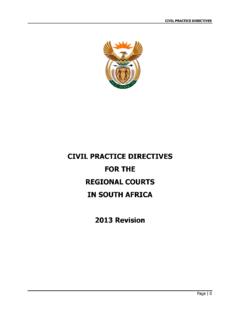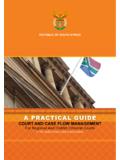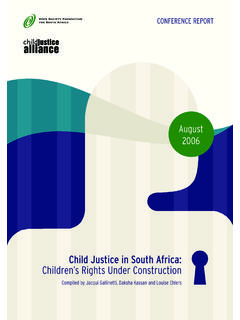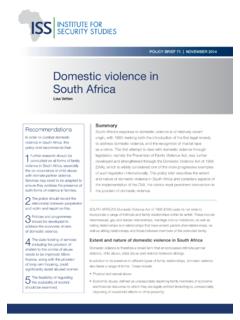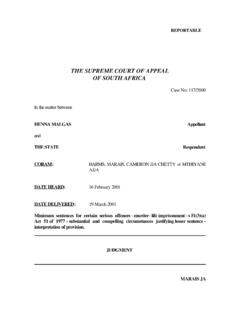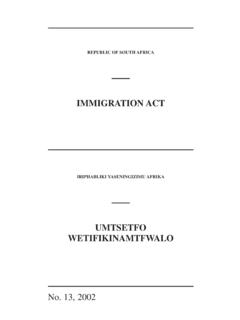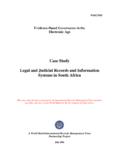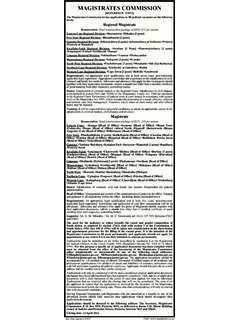Transcription of CONSTITUTIONAL COURT OF SOUTH AFRICA
1 CONSTITUTIONAL COURT OF SOUTH AFRICA Case CCT 41/16 In the matter between: MUYIWA GBENGA-OLUWATOYE Applicant and RECKITT BENCKISER SOUTH AFRICA (PTY) LIMITED First Respondent NADEEM BAIG Second Respondent Neutral citation: Gbenga-Oluwatoye v Reckitt Benckiser SOUTH AFRICA (Pty) Limited and Another [2016] ZACC 33 Coram: Mogoeng CJ, Moseneke DCJ, Bosielo AJ, Cameron J, Froneman J, Jafta J, Khampepe J, Madlanga J, Mhlantla J, Nkabinde J and Zondo J Judgment: Moseneke DCJ and Cameron J (unanimous) Decided on: 15 September 2016 Summary: Right to access to courts approximate equality of bargaining power settlement agreement full and final settlement waiver of right to access to courts not against public policy 2 ORDER On application for leave to appeal from the Labour Appeal COURT , dismissing an appeal from the Labour COURT : 1.
2 The application for condonation of the late filing of the application for leave to appeal is granted. 2. The application for leave to appeal is refused with costs. JUDGMENT MOSENEKE DCJ and CAMERON J (Mogoeng CJ, Bosielo AJ, Froneman J, Jafta J, Khampepe J, Madlanga J, Mhlantla J, Nkabinde J and Zondo J concurring): [1] This is an application for leave to appeal against an order of the Labour Appeal The applicant, Mr Muyiwa Gbenga-Oluwatoye, came to SOUTH AFRICA to work for the first respondent, Reckitt Benckiser SOUTH AFRICA (Pty) Limited (Reckitt). Reckitt specialises in manufacturing and distributing household products like air fresheners, deodorisers and atmosphere enhancers. Reckitt opposes the application, as does the second respondent, Mr Nadeem Baig, whom the applicant joined to the proceedings as Reckitt s regional human resources director.
3 [2] The application raises questions whether: (a) the applicant s employment contract provided for a right to a pre-dismissal hearing in terms of the common law of contract; (b) if not, whether the common law tacitly provides for a right to a pre-dismissal hearing in all employment relationships governed by contract; and 1 The applicant also asks this COURT to condone the late filing of this application. MOSENEKE DCJ and CAMERON J 3 (c) whether, notwithstanding (a) and (b), the settlement agreement between the applicant and Reckitt is lawful. [3] The applicant concluded a contract of employment with Reckitt on 16 June 2013. He started his employment as Reckitt s regional human resources director on 22 July 2013. An investigation for misrepresenting his qualifications and employment history began in February 2014.
4 This resulted in his suspension. The quarrel was that during his employment negotiations with Reckitt the applicant untruthfully identified Unilever as his then current employer, whereas in truth it was Standard Chartered Bank. Reckitt found this misrepresentation material since it was on this basis that it paid the applicant a sign-on bonus of US$40 000. Soon after the investigation, on 3 March 2014, the applicant was dismissed for misrepresentation. [4] The procedural fairness of the dismissal is in issue. The applicant alleges that there was no disciplinary hearing and this infringed his right to be heard. He says that clause of his employment contract expressly or by implication provides for a right to a fair hearing before the termination of his The respondents deny that the applicant was not afforded a pre-dismissal hearing.
5 [5] A further, crucial, issue arose. A mutual separation agreement was entered into by the parties to determine their future relationship (separation agreement). The applicant argued that he was coerced into signing this. He also took issue with clause of the separation agreement. This waived all recourse to the Commission for Conciliation, Mediation and Arbitration (CCMA) or the Labour COURT . 2 Clause , in relevant part, provides: The Company may terminate your employment under this agreement with immediate effect if at any time you .. are guilty of gross misconduct, mismanagement or neglect in the performance of any duty owed by you to the Company. MOSENEKE DCJ and CAMERON J 4 Litigation history Labour COURT [6] The Labour Court3 dismissed the applicant s urgent application for a declaratory order with It noted that the applicant s case was not based on the provisions of the Labour Relations Act5 but rather on the common law of It concluded that there was no procedural unfairness even though the applicant had contended that his contract of employment expressly or by implication entitled him to a pre-dismissal The COURT concluded that the claim of undue duress in signing the separation agreement was not supported by the facts.
6 And there was no economic duress because the situation was created by the applicant s own The COURT examined the validity of clause of the separation agreement that excluded recourse to the CCMA or the Labour COURT . It expressed its disquiet that this issue was raised for the first time in the applicant s replying affidavit. The COURT dismissed this claim anyhow. It found that the clause was nothing but the expression of the full and final settlement .9 Labour Appeal COURT [7] This COURT previously, in an order dated 7 August 2014, after the Labour COURT judgment, dismissed an application for leave to appeal as it was not in the interests of justice to hear the matter at [that] stage . The applicant then appealed to the Labour Appeal COURT . That Court10 also dismissed the The COURT endorsed 3 Molahlehi J.
7 4 Gbenga-Oluwatoye v Reckitt Benckiser SOUTH AFRICA (Pty) Ltd and Another unreported judgment of the Labour COURT , Case No. J580/14 (12 March 2014) (Labour COURT judgment). 5 66 of 1995. 6 Labour COURT judgment above n 4 at para 20. 7 Id at paras 20-1. 8 Id at para 35. 9 Id at para 39. 10 Savage AJA (Waglay JP and Coppin JA concurring). MOSENEKE DCJ and CAMERON J 5 the Labour COURT s findings regarding the separation It was thus unnecessary to pronounce on the contractual right to a pre-dismissal hearing under the employment contract the separation agreement superseded that employment [8] On duress, the Labour Appeal COURT noted that there were genuine disputes of fact. The applicant elected to proceed by way of notice of motion. He sought no referral to oral evidence or trial. Hence all claims had been settled and the applicant had waived his right to approach the CCMA or the Labour [9] The Labour Appeal COURT rejected the argument that the separation agreement violated public policy in limiting the applicant s right to access to Barkhuizen16 set out the test to determine whether terms of a contract were contrary to public policy (contra bonos mores).
8 Having regard to the parties relative positions, including their bargaining power and their level of knowledge of the contract, there was no inequity here. The applicant was employed in a senior management position. He had ample previous experience at senior level. There was no indication that he did not understand that the separation agreement limited judicial redress. The clause was meant to bring the relationship between the parties to finality. It was not unlawful. It should be upheld. 11 Gbenga-Oluwatoye v Reckitt Benckiser SOUTH AFRICA (Pty) Ltd and Another [2016] ZALAC 4; (2016) 37 ILJ 902 (LAC). 12 Id at paras 24-5. 13 Id at para 27. 14 Id at para 20. 15 Id at para 24. Section 34 of the Constitution provides: Everyone has the right to have any dispute that can be resolved by the application of law decided in a fair public hearing before a COURT or, where appropriate, another independent and impartial tribunal or forum.
9 16 Barkhuizen v Napier [2007] ZACC 5; 2007 (5) SA 323 (CC); 2007 (7) BCLR 691 (CC). MOSENEKE DCJ and CAMERON J 6 In this COURT [10] The applicant asks for condonation for a minimal delay of one day. The explanation is adequate. Condonation should be granted. [11] The applicant stands or falls on two grounds of appeal: (a) that he has a right to a pre-dismissal hearing under the common law; and (b) that the separation agreement is contrary to CONSTITUTIONAL principles. He appears to have abandoned his claim of duress. [12] The applicant maintains that his contract of employment expressly or tacitly implied the right to a pre-dismissal hearing. More so, SOUTH African law, he says, recognises an implied term in all contracts of employment to the effect that employees are entitled to a pre-dismissal hearing. The applicant submits that, if this COURT finds that no right to a pre-dismissal hearing vests in him, it ought to develop the common law to include it.
10 This he says raises an arguable point of law, as the Supreme COURT of Appeal has given conflicting decisions on the right to a pre-dismissal hearing under the common [13] The applicant submits that the separation agreement limits or contradicts his rights under sections 4 and 5 of the Labour Relations Act. These mean that any clause restricting an employee from recourse to the CCMA or the Labour COURT is contrary to fair labour practices under section 23 of the Constitution. The separation agreement is also against public policy as it deprives him of the right to challenge his dismissal. He says that the Labour Appeal COURT misapplied Barkhuizen. 17 See Boxer Superstores Mthatha v Mbenya [2007] ZASCA 79; [2007] 8 BLLR 693 (SCA); and Old Mutual Life Assurance Co SA Ltd v Gumbi [2007] ZASCA 52; [2007] 4 All SA 866 (SCA), which held that there is a common law right to a pre-dismissal hearing; but see SOUTH African Maritime Safety Authority v McKenzie [2010] ZASCA 2; [2010] 3 All SA 1 (SCA); and Transman (Pty) Ltd v Dick and Another [2009] ZASCA 38; [2009] 3 All SA 183 (SCA), which held that there is no common law right to a pre-dismissal hearing.










